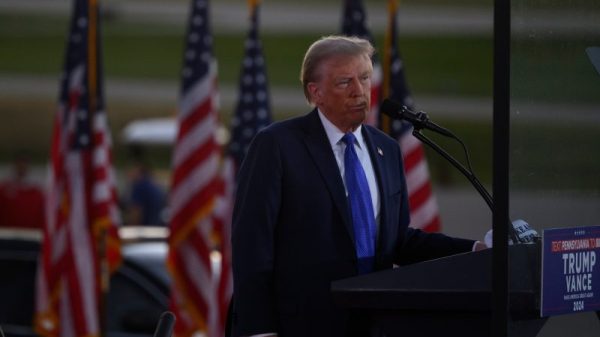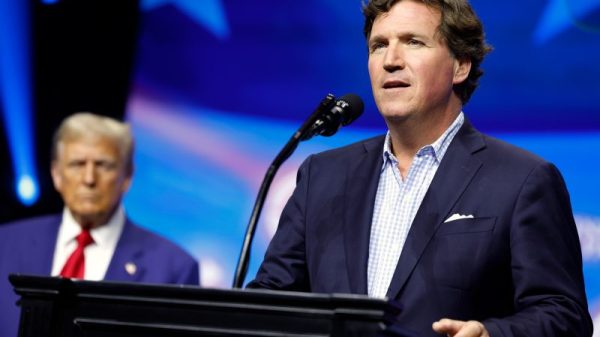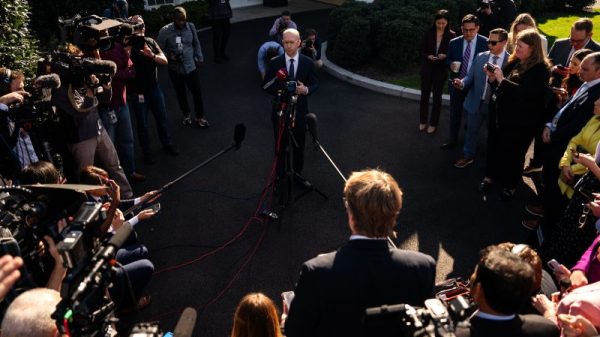SAN ANTONIO − Heisman Trophy winner Travis Hunter has suffered several injury scares during his college career, including a lacerated liver that kept him out of three games in 2023 and a shoulder injury that knocked him out of a game in October.
But he isn’t too worried about getting hurt in his final college game Saturday in the Alamo Bowl against BYU. Unlike all the other top NFL prospects who are skipping bowl games to avoid the injury risk, Colorado’s two-way football star has thrown caution to the wind. He soared through the air and put on a dunk show before a recent Colorado basketball game and now he’s expected to play nearly every play Saturday on offense and defense.
“I’m thankful for being able to play another game,” Hunter said recently on his podcast. “I don’t think I could have went a whole ‘nother month without playing football.”
It helps that Colorado has paid the premium on insurance policies to cover him and others in case they’re injured in the Alamo Bowl. Yet history shows the many ways those policies can fall short when millions of dollars are at stake. Hunter’s decision also adds fuel to the debate about whether an NFL team should allow him to play both ways like he wants to, since that also adds to the injury risk for this unique freak of an athlete.
“Is it really worth the risk of being permanently disabled and never achieving your dream of playing in the NFL, or playing in a Super Bowl, or signing several lucrative NFL contracts amounting to generational wealth, just to play in the 2024 Alamo Bowl on Saturday?” said Richard Giller, a renowned sports insurance recovery attorney in Los Angeles.
Giller said in an email that “there is absolutely NO reason that Hunter should ever play in what amounts to a meaningless, non-(playoff) bowl game, and risk his financial future to do so.”
The Willis McGahee case
As a projected top-10 NFL draft pick, Hunter stands to sign a multi-year contract for around $20 million-$40 million. The same goes for Colorado quarterback Shedeur Sanders, who also is playing in the bowl game instead of opting out. On Thursday, Sanders was asked why he’s risking it to participate.
He noted he could have turned pro after last season if he was concerned about an injury in college hurting his future earnings potential.
“We may not get to ever have a chance to play again together on the same team,” he said. “So it’s about cherishing the moment. It’s about knowing this is the final collegiate game. And each and every game we left it all out there. So there’s no regret. I don’t never want to go anywhere with regret.”
There still are enough cautionary tales to make them consider whether one last college game is worth it before the NFL draft in April. In 2003, University of Miami running back Willis McGahee also was projected to be a top draft pick before he severely injured his left knee in the 2003 Fiesta Bowl against Ohio State. He slipped to the 23rd pick in the draft and got a $7 million contract for five years, plus incentives.
Notre Dame linebacker Jaylon Smith also fell in the draft after injuring his knee in the 2016 Fiesta Bowl. So did Michigan tight end Jake Butt, who injured his own knee in the Orange Bowl later that same year.
All had insurance policies. But none really came close to covering the gap of what they really lost because of bowl game injuries, according to reports. In Butt’s case, he was due to collect $543,000 from his insurance but fell so far in the draft that he ultimately lost $2.8 million because of the injury, according to ESPN. In McGahee’s case, he took out a $2.5 million policy shortly before the bowl game but only could collect on it if he never played football again. He returned to play in 2004 and played 10 seasons in the NFL.
Fighting for insurance payouts
It all depends on what kind of policy the players have, if it’s more than just disability coverage and what the language of the insurance contract states.
Colorado declined to provide additional details about the insurance policies purchased for Hunter and Sanders but described it as disability insurance. There aren’t many publicly confirmed cases where insurers for these types of policies have paid out to college athletes, said Josh Lens, an associate professor at Iowa who has researched insurance coverage for college athletes.
“For permanent total disability policies, for example, a lack of publicly confirmed payouts can largely be attributed to the policy language, which typically requires an injury or illness that prevents the athlete from participating in their sport,” Lens said.
It also can turn into a battle when injuries happen and players file claims to collect on the insurance. Giller said he’s helped dozens of professional athletes with various types of disability insurance policies in which their claims were initially denied.
“I have recovered payouts in every case, but in my experience, the higher the loss (and $20 million would be a large loss), the more likely it is that the insurance company would try to find a way not to pay out under the policy,” Giller said in an email.
Travis Hunter’s other risk concerns
Hunter is unique in that he plays nearly every play as a cornerback and receiver and participated in 1,443 snaps this season. More plays mean more injury risk. Which is why NFL teams might be wary of letting him play both ways. They don’t want to jeopardize their big financial investment in him if another top player can fill in at receiver, for example, allowing Hunter to rest and focus on one position instead.
Giller also notes Hunter’s size of just 185 pounds.
“Very few NFL players have ever played both ways and it is highly doubtful, given Hunter’s size, that an NFL team would allow him to play both ways,” said Giller of the firm Greenspoon Marder. “The dollars being invested in first-round draft picks are just too high these days to take a risk.”
Yet there is insurance for that, too. He said NFL teams can purchase a temporary total disability policy to cover the possible financial losses associated with the guaranteed portion of players’ contracts.
The counterargument
Hunter didn’t become the great football player he is by worrying about all the risks lurking around every corner and holding himself back. If future financial risk is the paramount concern, why even play in final regular-season games when your team is out of contention for a championship?
At some point, all the risk mitigation can limit the player’s potential, in addition to damaging the entertainment product as it has for many non-playoff bowl games.
Both players also take cues from their coach, Deion Sanders, who wanted both to play in this game even though he’s a strong advocate of players maximizing their financial futures.
“Our kids are gonna play in our bowl game, because that’s what we signed up to do and we’re gonna finish,” Deion Sanders said last month. “We’re not gonna tap out, because that throws off the structure of next season. There’s a couple (teams), you take note, they lay an egg in the bowl game and they haven’t recovered since. We don’t plan on doing that.”
Kickoff at the Alamodome in San Antonio is set for 7:30 p.m. ET on ABC.
Follow reporter Brent Schrotenboer @Schrotenboer. Email: bschrotenb@usatoday.com




























